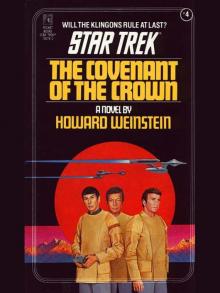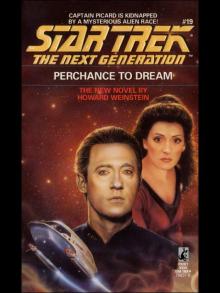- Home
- Howard Weinstein
PRECHANCE TO DREAM Page 6
PRECHANCE TO DREAM Read online
Page 6
“Counselor Troi, are you bored?”
“Are you?”
“Is a sun hot?” Gina answered dully as she sat up, hugging her knees to her chest. “You bet I’m bored. It feels like we’ve been here for weeks, not hours.”
“What else do you feel?”
“Hmm.” Gina’s face scrunched thoughtfully. “If I don’t get out of this teeny-tiny shuttle soon, I might just go stark-raving bonkers—?”
“I see,” Troi said with patient amusement.
Gina picked up the lack of urgent concern in Troi’s voice. “I guess you don’t think I’m about to crack under the pressure?”
“I don’t think so, Gina. The feelings you’re having are entirely normal for anyone in this situation, especially adolescents. In fact, if you didn’t have them, then I’d be worried.”
“Hyper-hormones, huh?”
Troi let a laugh slip out. “Something like that. Adolescents are still struggling with the childish impulse for instant gratification. You three are much brighter and more mature than many of your peers, so you’re much better equipped to deal with those feelings.”
“Are you sure about that?” Gina asked, her brows rising into a dubious arch.
“You verbalized your feelings rather than acting on them. That’s a sign of maturity and—”
Deanna stopped short when half the consoles and cabin lights flickered back to life.
“Yippeee!” Gina clapped her hands as she whooped, then looked mortified. “That wasn’t a sign of maturity, was it?”
“Mmm . . . it’ll be our little secret.” Troi’s part of the secret was that she’d felt like cheering, too.
They both looked up as Data appeared at the mid-ship opening leading to the cockpit, a central spot from which he could address all hands. “Gina, Wesley and Ken—you have all been most helpful,” the android said as Troi gave him an approving nod. “Main life-support systems and scanner arrays are now restored to stable and fully operative status.”
Gina raised a tentative hand. “Should I activate exterior illumination, Commander?”
“Affirmative, Gina. I believe it is time we got a comprehensive look at our immediate surroundings.”
As the others pressed their faces to the nearest windows, Gina clambered to her feet, slid into the chair at her console and keyed three of the shuttle’s running lights and spots for wide-beam. As the lights flashed on, they revealed that the shuttle had somehow been deposited inside a cavern, high-domed, but little more than ten or fifteen meters across—and for just a fleeting moment, the compact vessel was surrounded by a multi-colored swirl, the same as they’d seen in space. But the ribbons of color reacted as if they’d been frightened by the sudden brightness of the shuttle’s lights and they vanished in an instant, quickly enough to make Troi wonder if they’d truly been there.
As the apparent reality of where they were trapped took root, Troi herself felt what she could tell the younger crew members were feeling—dismay, coupled with as yet unanswerable questions. Gina was the first to voice that common reaction.
“Where in god’s name are we?” She peered out the viewport, craning her head from side to side, trying to take in all the eerie beauty of the cavern, with glittering mineral deposits studding its walls and rocky arches—yet hoping to see something other than what was there.
“It would appear,” said Data, looking over her shoulder, “that we are in a cavern.”
“But a cavern where, Data,” Troi wondered. “Are we inside Domarus Four? And if we are, how did we get here?”
“There is no way to be certain. But until and unless we uncover evidence to the contrary, the most likely conclusion is that we are indeed inside Domarus Four. As to how we got here, I believe the phrase is ‘Your guess is as good as mine.’ ”
Wesley poked his head back from the cockpit. “Commander, now that we’ve got sensors working, should we run a scan and find out what’s out there?”
“Please do so, Ensign, with Ken’s assistance. We will need to know the atmospheric composition of our immediate environment—particularly whether it poses any immediate risk to us and the shuttlecraft. Gina, I would like you to pay specific attention to spectro-analysis of the cave’s geological makeup and structure.”
As the young away-team members busied themselves, Troi leaned close to Data and spoke confidentially. “I’m concerned about them.”
“How so, Counselor?”
“When those lights came on, I felt fear in all of them, even Wesley.”
Data nodded. “Is that not natural?”
“Oh, yes. And though they are too well-trained to be paralyzed by fear, it is not going to disappear. The longer we’re here, the more they are going to look to us to help them deal with that fear.”
“Ahh.” Data paused for a moment’s consideration of Troi’s prediction. “And what should we do to deal with that?”
“Actually, what you’re doing is fine.”
“Oh. That is encouraging.” Data’s eyes brightened with pleasure at the notion that he had provided appropriate support for fragile human psyches. But then his brow furrowed as if he’d run across a previously overlooked gap in his programming. “And . . . what is it that I am doing?”
Troi smiled reassuringly. Data was the most guileless being she’d ever known, a characteristic she still found as charming as the day they’d first met. “Keeping them occupied—treating them as important members of this crew.”
“I see. Then that will be an easy strategy to continue, Counselor . . . they are important members of this crew.”
Chapter Five
GONE FISHING . . .
I’d put up a sign, Picard thought as he hiked back toward the stream, but who’s to care where I’ve gone?
By the position of the Domaran sun, he guessed it to be mid-afternoon. He’d done a bit more scouting of his immediate vicinity and judged it a nice enough setting for a vacation cottage, though he’d have preferred some more choice in the matter than had been offered by the manner in which he’d been whisked off the Enterprise without word or warning.
With no way to figure the eventual duration of his stay here, he’d also picked out a suitable spot for an overnight camp—a crested clearing bounded by woods on two sides and hills on the other two. In addition to being relatively high ground, the campsite offered proximity to a ready supply of firewood—though he didn’t have any tree-chopping tools, he’d seen plenty of branches lying on the ground during an exploratory stroll through the woods. There were also some small caves nicked into the nearby rocky hillsides, apparently uninhabited by any native animal life, and more than adequate in case he needed a more protected place to stay.
Next concern—how to catch dinner. He’d considered—briefly—the most basic fishing method: bare hands. But Picard recognized the reality that he wasn’t quite that elemental, and he had a hard time picturing himself swiping at leaping fish like some wild bear. With no sporting goods shops in sight, and nothing likely to be serviceable as fishing line to attach to a rod, he decided on a reasonable compromise—spearfishing. He’d never attempted it himself, but he’d seen the age-old technique demonstrated by practitioners from various human and alien cultures. The principle was straightforward enough. It remained to be seen how that would translate into practice.
He sat on the stream bank, near the water and next to a batch of straight, slender branches, all at least a meter long, collected in the woods to be made into spears. Using a rough stone he’d found, he whittled and filed the ends of the best branches into lethal points. As he worked, he heard occasional splashes of fish breaking the stream’s surface.
Are they exercising or doing reconnaissance? he wondered as he watched their acrobatics. Picard couldn’t help smiling as he remembered how indifferent a fisherman he’d been as a boy. He’d tag along with his brother Robert when he and the other older boys in their village would go to fish in the river or the lake near the family vineyards. Robert had usually considered li
ttle Jean-Luc’s presence an embarrassment, but their mother would strongly suggest that he take his younger brother along . . . though I’m not sure why I wanted to go.
Picard paused to examine his craftsmanship. Two other spears were done, but this one wasn’t quite ready. With smooth strokes, he grated stone against wood, sending fine chips and dust flying. Perhaps I just didn’t want to be left out. He chuckled at a rueful memory—Robert mocking him mercilessly because of his distaste for grasping wriggling worms with his fingers and impaling them on sharp hooks—the worms, not my fingers—though a fair number of fingertips were pierced in the process.
Finally satisfied with his third spear, Picard set it down with the others and leaned forward, watching the fish darting about in the clear stream, recalling later trips to the lake without sibling supervision. No longer compelled by peer pressure to fish, he’d learned the joys of just rowing out with a few friends for conversation and contemplation, luxuriating in the tranquil warmth of the sun and the soothing lap of the water against the boat. Ahh . . . and there was no more ideal setting in which to woo a young lady in romantic privacy . . . as long as obnoxious friends didn’t seek you out with the express intention of starting a splash fight.
Picard stood up and hefted the different spears, checking for feel and balance. With a shrug, he decided none of them exactly constituted a finely tooled weapon and simply chose one at random; he tossed the other two onto the pile of unfinished branches where they landed with a clatter.
If this works, Picard thought as he reached the water’s edge, perhaps I might try my hand at penning a novel—The Old Captain and the Stream.
He drew his arm back, waited with the spear head high for an unsuspecting fish to swim within range, then hurled it—
—and watched the fish dart away as the spear point split the stream’s surface and drove itself into the muddy bottom, stirring up enough silt to thoroughly cloud the formerly clear water. Perhaps this wasn’t going to be as easy as he’d hoped.
He bent down, snatched up another spear and set himself once again. A pair of fish drifted close and his arm snapped forward. The spear cut through the water and missed again.
Third try—arm cocked—and a third failure. And all three spears were now embedded in the mud, the ends of their shafts sticking up out of the water. Out of Picard’s dry-land reach. He had a choice: make new ones or retrieve the old.
It was obviously more efficient to get the existing spears. He didn’t want to get his boots wet and didn’t feel like taking them off, so he mapped out a cautious approach to the weapons. All he had to do was step carefully on a few rocks rising partway above the stream’s surface.
“Not very good at this, are you, Picard?”
The totally unexpected sound of a voice startled him, but he located the source immediately—the other side of the stream, the edge of the forest, about thirty meters back from the far bank.
“Captain Arit, I presume?” he called across. “So—we were both brought here. Interesting.”
“No one said I was brought here.”
“Came on your own, then, did you?” His tone, dry and skeptical, made it clear he didn’t believe that for an instant. “How long have you been watching?”
The Teniran commander moved a couple of wary strides toward the water, then stopped as if she preferred not to stray from the sanctuary of the forest behind her.
“Your whole sorry attempt.”
“Can you do better?” he challenged amiably as he stood on the shore with his hands on his hips.
“Probably.”
Picard sensed a careful confidence in her reply. “Care to try?”
“No.”
“We’ll need food.”
“It could be a long time coming at the rate you’re going, Picard.”
“How long have you been here on the planet?” He waited for an answer that obviously wasn’t coming. What was Captain Arit’s secret? Hoping to elicit a tad more trust, he answered his own question. “I’d say I arrived about three hours ago. I haven’t been able to establish contact with my ship. I’m assuming the facts are very much the same in your case—?”
“Assume all you want, Picard,” Arit said, then turned and disappeared into the trees.
Picard watched her go, then shrugged to himself. “Strange.”
Back to fishing. Or, to be more accurate, back to spear retrieval. He took a measured step out onto the closest rock, making sure it was firmly placed in the stream bed. It seemed solid enough. Two more short strides and he’d be able to reach the spears.
Perhaps Arit was right about his not being especially proficient at all this. Then again, he’d had no right or reason to expect instant success. Who would? Still, he had faith in his coordination and believed he’d get the gist of it soon enough. He stepped onto the next flat stone with his other foot—and slipped on a fine coating of damp moss. He teetered for a short eternity, failed to regain his footing and toppled sideways into the water.
From somewhere on the fringe of the forest, he heard the distinctly annoying sound of laughter.
The hatch to the Glin-Kale’s bridge slid halfway open, groaned, creaked and jammed. Jevlin glared at the wall panel housing the mechanism, then whacked it with his walking stick. The door opened the rest of the way.
He entered—then, much like the hesitant hatch, halted in mid-hobble when he saw Valend Egin waiting for him. “Is there some incredibly good reason for you to be on the bridge, Egin?”
“I’ll thank you to address me by my rightful title, Jevlin.”
“Yes, I’m sure you would. So I’ll save us both the trouble,” the old first officer muttered as he moved to the operations console just left of the empty command chair.
“I have every right to be on the bridge.”
“I suppose you do. Just don’t get in our way . . . Valend.” Jevlin turned to the female officer seated at the console. She was hardly more than a child, her mane still short and downy, not the luxuriant fur of a mature Teniran adult. How qualified can she be? How much experience can she have? Are we that desperate that we put children to work on the bridge?
He knew the answer to that: Yes. Vital posts had to be attended, and the critical losses suffered in the Ziakk Five disaster left few choices. Anyone who could do a job did it, regardless of age.
“I—I’m sorry, sir,” she said, sitting stiffly in her seat. “I haven’t been able to locate Captain Arit down on the planet. Sensors just don’t seem to be working right. I—I’ll keep trying, sir—that is, if you want me to.”
Jevlin gave her an avuncular wink. “That’s the spirit, Mahdolin. Can’t imagine where else the cap’n might be. Just keep up the good work.” He turned toward the command chair, and found Egin blocking his way.
“Jevlin, how long do we look for her?”
“You sound like you’re ready to quit.”
“The reality is, she may be gone. We may never—”
“She’s not gone,” Jevlin shot back, his tone more charged than he’d intended. He sensed the half-dozen crewmen working about the bridge glancing his way and damned himself for giving Egin the satisfaction of so much attention. But Egin had this knack for taxing anyone’s patience to the breaking point. As long as I can keep from pounding him with this old walking stick . . . “What would you have us do?”
“Start colonizing this planet now, before the Federation ship can stop us.”
Jevlin just stared, then spoke through gritted teeth. “You . . . are . . .” He took a deep breath, tightened his grip on his stick, then lowered his voice to a ragged whisper. “That . . . is not wise . . . not until we know what’s happened to Arit . . . and surely not until we have a pretty good idea it’s safe down there.”
“I want—”
“Jevlin, I don’t care what you want. With Cap’n Arit off the ship, I’m in command. And I’ll not risk another precious Teniran life without good cause just because you want to start your make-believe government. Now, I’ve got
work to do, so if you’ll excuse me.”
With that, Jevlin turned his back on the sputtering Egin and stalked off the bridge, thankful that this time the balky hatch shut behind him.
He made his way down toward the engineering deck, wishing there were some alternate route—one where he wouldn’t have to pass shabbily clothed families with their meager salvaged belongings, closely huddled in crowded corridors. Huddled for warmth in the underheated lower-level passageways. Huddled because space was at a premium. Huddled because the ones who had come this far needed to feel the touch of those who had survived with them.
Though Jevlin knew it would be easier on him to avoid looking into their faces as he limped by, he couldn’t help it. They weren’t cargo, and he couldn’t bear to treat them that way. Meeting their gazes might somehow make these refugees believe that they mattered. It wasn’t much, but it was all he could do for them for now.
Arriving at the engineering compartment, he found that the entry door had been wedged three-quarters open by technicians weary of wondering whether or not it would operate, and Jevlin eased through. He found a rail-thin officer, as old and grizzled as himself, leaning over a workbench with electronic components and diagnostic tools spread haphazardly across its surface. To Jevlin’s untutored eye, it looked like some old computerized gadget had blown apart under extreme stress. Then again, sometimes it seemed like their whole ship was only a short step away from suffering a similar fate. “Chief.”
The engineer glanced up from his repair work. “It took you long enough to get here.”
Jevlin’s brows arched. “Don’t move as fast as I used to—and neither do you, Naladi.”
“And neither does the old Glin-Kale, I’m afraid.”
“She’s still here . . . how bad can it be?”
Naladi prefaced his words with a sigh. “Bad enough.”
Jevlin waved at the parts scattered atop the workbench. “This stuff?”
“This? This is my relaxation break, trying to see if I can salvage anything for us to use later. Take a look, Jevlin.” The chief engineer swiveled to face his adjacent desk, and reached over to key his computer board as Jevlin leaned over for a closer look. A diagnostic schematic appeared on a screen mottled with dust and streaked by fingertips that had made a halfhearted attempt to wipe it clean. This place was just as disordered and unkempt as the rest of the ship, an observation that Jevlin found distressing. It even smelled stale. Chief Naladi used to be obsessed with having everything spit-shined and spotless. Nowadays, it was all he could do to keep the Glin-Kale running.

 V06 - Prisoners and Pawns
V06 - Prisoners and Pawns THE COVENANT OF THE CROWN
THE COVENANT OF THE CROWN POWER HUNGRY
POWER HUNGRY PRECHANCE TO DREAM
PRECHANCE TO DREAM Perchance to Dream
Perchance to Dream